
Liechtenstein, officially the Principality of Liechtenstein, is a doubly landlocked German-speaking microstate in the Central European Alps, between Austria in the east and north and Switzerland in the west and south. Liechtenstein is a semi-constitutional monarchy headed by the prince of Liechtenstein of the House of Liechtenstein, currently led by Hans-Adam II. It is Europe's fourth-smallest country, with an area of just over 160 square kilometres and a population of 40,023. It is the world's smallest country to border two countries, and is one of the few countries with no debt.
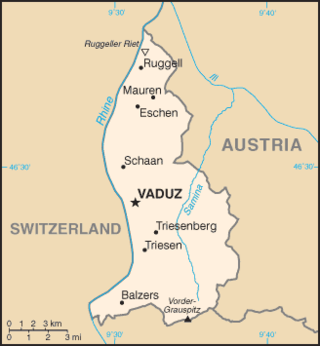
The principality of Liechtenstein encompasses most of the eastern half of the Rhine Valley, wedged between Austria and Switzerland. The majority of the country's population is found in the western half along the Rhine River. Along with Uzbekistan, Liechtenstein is one of only two doubly landlocked countries in the world.

The economy of Liechtenstein is based on industry, with a small but significant agricultural sector, and services. The country participates in a customs union with Switzerland and uses the Swiss franc as its national currency. It imports more than 85% of its energy requirements. Liechtenstein has been a member of the European Free Trade Association (EFTA) since 1991. It also has been a member of the European Economic Area (EEA) since May 1995 and participates in the Schengen Agreement for passport-free intra-European travel.
This article concerns the systems of communications in Liechtenstein. Liechtenstein possesses a number of modern communications systems, some of which are shared with the neighbouring country of Switzerland. The country code and top-level domain for Liechtenstein is .li.

Political identity came to the territory now occupied by the Principality of Liechtenstein in 814, with the formation of the subcountry of Lower Rhætia. Liechtenstein's borders have remained unchanged since 1434, when the Rhine established the border between the Holy Roman Empire and the Swiss cantons.

Schellenberg is a municipality in the lowland area of Liechtenstein, on the banks of the Rhine. As of 2019, it has a population of 1,107 and covers an area of 3.5 km2 (1.4 sq mi)
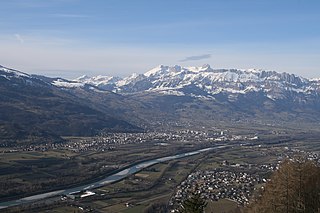
Schaan is the largest municipality of Liechtenstein by population. It is located to the north of Vaduz, the capital, in the central part of the country. As of 2019 it has a population of 6,039, making it the most populous administrative district in Liechtenstein. Representing an important traffic hub and industrial location of the country, Schaan covers an area of 26.92 km2 (10.39 sq mi), including mountains and forest. It is a municipality within the electoral district of Oberland in the Principality of Liechtenstein. Schaan contains four enclaves: Brunnenegg, Gritsch, Guschg, and Plankner Neugrütt.
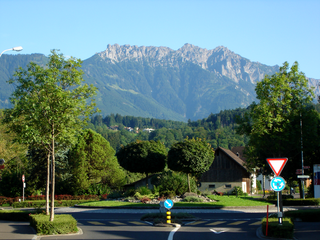
Ruggell is a municipality of Liechtenstein. It is the northernmost and lowest elevated municipality. As of 2019, it has a population of 2,322.

The Eastern Alps are usually defined as the area east of a line from Lake Constance and the Alpine Rhine valley, up to the Splügen Pass at the Alpine divide, and down the Liro River to Lake Como in the south. The peaks and mountain passes are lower than the Western Alps, while the range itself is broader and less arched.
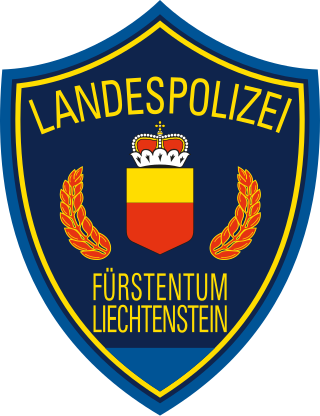
The National Police of the Principality of Liechtenstein, is the national police force of Liechtenstein. It is composed of 125 employees, with 91 officers and 34 staff, who police the 160 km2 (62 sq mi) doubly landlocked alpine state in Western-Central Europe. Bordered by Switzerland to its west, and Austria to its east, Liechtenstein maintains a trilateral treaty which enables close cross-border co-operation between the police services of the three states. Liechtenstein is also a member of Interpol, and a signatory to a variety of other treaties.

Liechtenstein Bus is a bus company based in Vaduz, Liechtenstein. The company operates a total of 19 petrol-powered buses and 27 diesel buses on a network of 25 routes throughout Liechtenstein. Many services operated by Liechtenstein Bus venture over the borders into Switzerland and Austria.
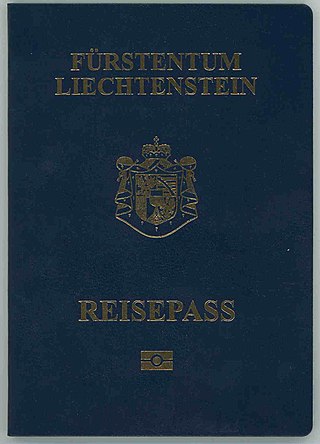
Liechtenstein passports are issued to nationals of Liechtenstein for the purpose of international travel. Beside serving as proof of Liechtenstein citizenship, they facilitate the process of securing assistance from Liechtenstein consular officials abroad.
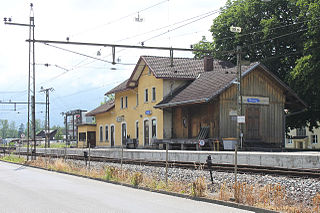
Nendeln is a village located in the municipality of Eschen in Liechtenstein. As of 2023, 1,407 people live within Nendeln.

Schaanwald is a village in Liechtenstein, located in the municipality of Mauren.
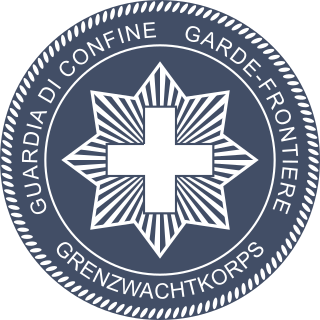
The Swiss Border Guard, known as the Swiss Border Guard Command was a federal law enforcement agency, which acted as both the border guard and customs service for Switzerland. It was a uniformed and armed section of the Federal Customs Administration, which is attached to the Federal Department of Finance. It was the largest civilian security agency on a federal level.

Relations between the Principality of Liechtensteinand the European Union (EU) are shaped heavily by Liechtenstein's participation in the European Economic Area (EEA).

Diplomatic and economic relations between Switzerland and Liechtenstein have been close, with Switzerland accepting the role of safeguarding the interests of its smaller neighbour, Liechtenstein. Liechtenstein has an embassy in Bern. Switzerland is accredited to Liechtenstein from its Federal Department of Foreign Affairs in Berne and maintains an honorary consulate in Vaduz.

The Liechtenstein identity card is issued to Liechtenstein citizens by the Immigration and Passport Office in Vaduz. The card costs CHF65 for adults aged 18 or over and is valid for 10 years. For children, the card costs CHF30 and has a validity of 3 years.
Events in the year 2007 in Liechtenstein.
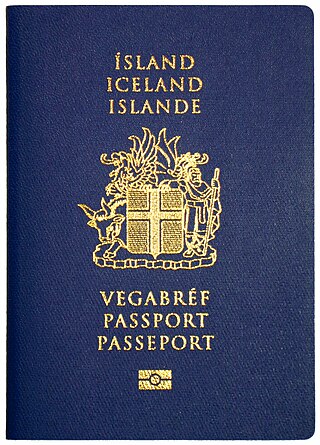
Passports of the EFTA member states are passports issued by the European Free Trade Association (EFTA) member states Iceland, Liechtenstein, Norway and Switzerland. EFTA is in this article used as a common name for these countries.


















